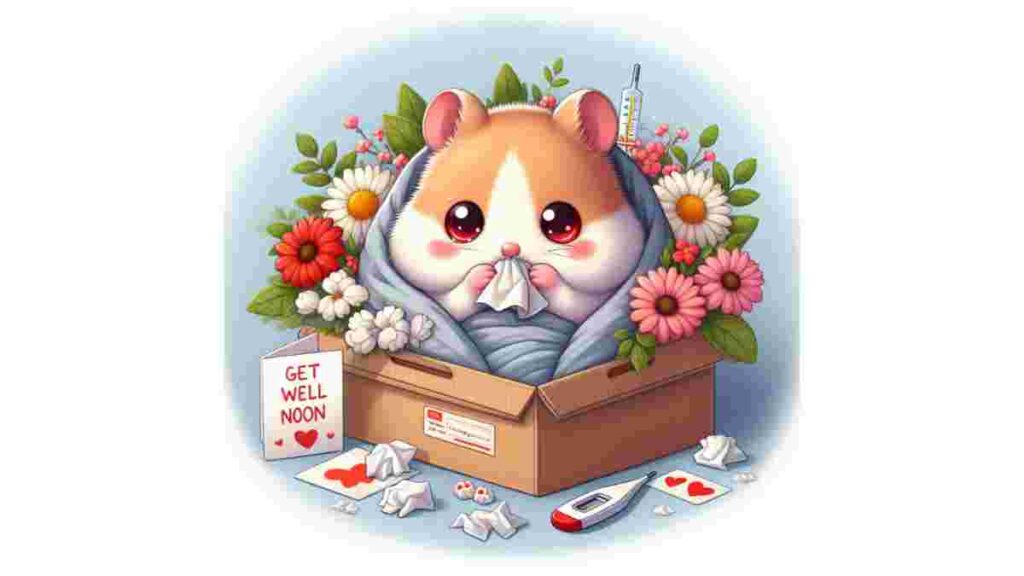Should I Let My Hamster Die Naturally: When it comes to the care and love we provide our pets, facing their end-of-life phase is one of the most challenging periods for any pet owner. Hamsters, despite their small size, occupy a big place in our hearts. Understanding how to support them in their final days, and making decisions about their end-of-life care, can be both emotionally taxing and morally complex.
This post aims to guide hamster owners through this difficult time, offering insights into the best practices for caring for an aging or ailing hamster, ethical considerations to weigh, and advice on coping with loss.
Let’s understand this in detail, “Should I Let My Hamster Die Naturally“.
Click here to ensure the best nutrition for your rodent friend
Find the best hamster wheels from here

Table of Contents
Understanding End-of-Life Care for Hamsters – Should I Let My Hamster Die Naturally?
Signs of an Aging or Ailing Hamster
Hamsters have a relatively short lifespan, typically living between 2 to 3 years. Signs that your hamster may be nearing the end of their life include decreased activity levels, less interest in food and water, changes in sleeping patterns, and possibly more visible signs of illness such as labored breathing or weight loss. Providing comfort and care becomes paramount as they age.
The Role of the Pet Owner in Providing Comfort and Care
The primary goal for any pet owner during this time should be to ensure their hamster’s remaining days are as comfortable as possible. This means regular, but gentle handling (if the hamster allows), maintaining a clean habitat, and monitoring for any signs of discomfort or distress.
Ethical Considerations
Deciding whether to allow a pet to die naturally or considering euthanasia is never easy. Here are a few considerations:
Quality of Life
The key factor in making this decision is often the quality of life your hamster has. If they are in pain, suffering, or have a significantly decreased quality of life, euthanasia might be the kindest option.
Natural Death vs. Euthanasia
Some pet owners prefer to allow their pets to pass naturally, believing it to be a gentler or more natural process. However, it’s crucial to consult with a veterinarian to understand if your hamster is in pain and whether euthanasia would prevent unnecessary suffering.
Practical Tips for Quality End-of-Life Care
Creating a peaceful and comfortable environment is essential. Ensure their cage is kept clean, warm, and quiet. Bedding should be soft and access to food and water should require minimal effort from your pet. Consult your veterinarian for advice on pain management and any specific care requirements.
Coping with Loss
The loss of a pet can be a profound grief experience, and it’s vital to allow yourself to mourn. Seek out supportive friends, family, or online communities who understand the loss of a pet. Remember, it’s okay to seek professional help if you’re struggling to cope.

Conclusion – Should I Let My Hamster Die Naturally?
Facing the final days of a beloved hamster’s life is a profound responsibility. It’s about providing comfort, making the best decisions possible with the information and resources we have, and ultimately, it’s about love. Whether you’re currently navigating this challenging time, or preparing for the future, remember that you’re not alone. Many have walked this path and understand the weight of your choices and your loss.
We invite you to share your experiences, ask questions, or seek support in the comments. Together, we can offer comfort to one another during these trying times.

Frequently Asked Questions (FAQs) – Should I Let My Hamster Die Naturally?
How do I know when it’s time to consider euthanasia for my hamster?
Knowing when it might be time for euthanasia involves assessing your hamster’s quality of life. Signs such as constant pain, severe difficulty breathing, chronic and incurable illness, significant loss of appetite, or complete lack of interest in surroundings can all indicate that your pet is suffering. Consultation with a veterinarian can help you make this difficult decision, taking into account the specifics of your hamster’s health and condition.
Is it normal to feel intense grief after the loss of a hamster?
Yes, it’s completely normal to feel intense grief after losing a pet, regardless of their size. Hamsters are beloved companions, and their loss can have a profound emotional impact. Allow yourself to mourn and seek support from friends, family, or pet loss support groups. Remember, grieving is a highly personal process, and there’s no right or wrong way to feel.
Can other pets in the household sense the loss of a hamster?
Other pets may not understand death in the same way humans do, but they can sense changes in their environment and may notice the absence of your hamster. They might show signs of stress, confusion, or search for the missing pet. Providing extra attention and comfort to your remaining pets can help ease this transition.
How can I memorialize my hamster?
Creating a memorial for your hamster can be a comforting way to honor their memory. This could be as simple as planting a tree or flowers in their memory, creating a photo album or scrapbook with pictures and mementos, or even holding a small memorial service. Choose a method that resonates with you and helps you cherish the happy times you spent with your pet.
What should I do with my hamster’s belongings after they pass away?
Deciding what to do with your hamster’s belongings is a personal choice and can vary depending on what feels right to you. Some owners find comfort in donating usable items like cages, toys, or unopened food to local animal shelters or rescues. Others may choose to keep certain items as mementos. It’s okay to take your time before deciding what to do.
